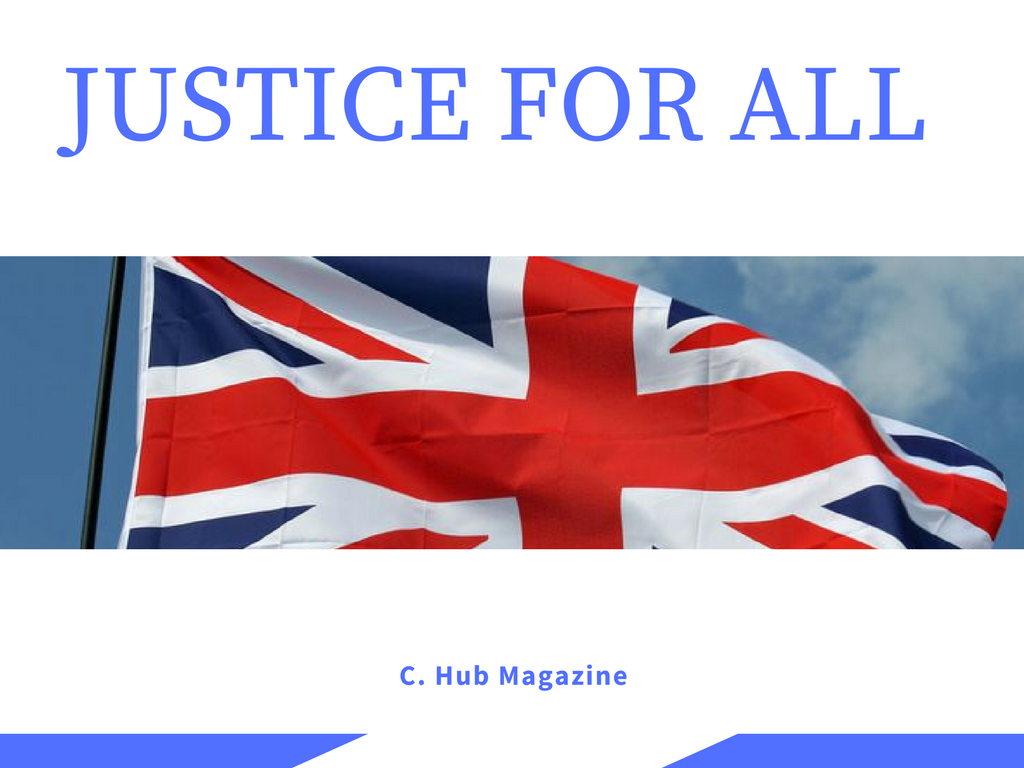Great Britain: Justice for all or justice for some?

These African Illustrators are Making their Mark in the Fashion Industry
June 3, 2017
5 Out of the Startups Making Nigeria Proud
June 5, 2017Great Britain; Lack of Justice for some is lack of justice for all.

We live in a society where the word justice has been frivolously used as a term to describe many things and situations, but how often do we actually see justice in action?
People have a tendency of saying life is not fair, we have become conditioned to put up with unfair situations and take it as fate. Well, we don’t have to put up with unfairness; we don’t have to live in a society where a part of that society is treated differently to another part .
For purposes of this piece I will simplify justice and look at it from three levels then focus on one which brings all three together.
The three levels include :
1.Personal: On personal level, we consider how we treat the people around us in private and in public
2.Community: Social justice relating to how individuals relate to each other within their communities.
3.Government: Role of government towards equitableness of citizens and corporations through laws and effective governance system.
Government should be the main promoter of important public values, such as justice, that are essential to a good society. Without a strong public sector, life in the United Kingdom would be less just, less free, more unequal, and more insecure. The government uses various policies and laws to ensure various parts of society can experience and live justice. Justice is not usually something provided by the marketplace or created by the actions of individuals. Individuals and corporations have vested interests hence their actions will normally pursue these interests regardless of the justice of those involved. More often justice is something that can only be provided and sustained in the public sphere by the actions of government organisations like the courts and the legislatures. If we want a just society, we must work through government to get it.
Justice can be described as fair behaviour or treatment. A concern for justice, peace, and genuine respect for people” Other words that can be used to describe justice include, justness, fair play, fair-mindedness, equity, equitableness, even-handedness, egalitarianism, impartiality, impartialness, lack of bias, objectivity, neutrality, lack of prejudice, open-mindedness, non-partisanship; honour, uprightness, decency, integrity, probity, honesty.
Social justice is a concept rooted very tenuously in the Anglo-Saxon political culture. It does not appear in the United Nations Universal Declaration of Human Rights or the two International Covenants on Human Rights. Frequently referred to in the Copenhagen Declaration and Programme of Action adopted by the World Summit for Social Development in 1995, social justice was scarcely mentioned five years later in the United Nations Millennium Declaration.
The rise in inequality in the distribution of income among people is well-documented and displays the characteristics of a trend globally but this is well evident within developed nations. Consider what’s happening in Europe’s most affluent nations of Germany, United Kingdom, France and globally in America and China. Social injustice continues to dominate the daily lives of many with many children born in poverty, dying in poverty and that vicious cycle repeating itself. Income-related inequalities, notably in the ownership of capital and other assets, in access to a variety of services and benefits, and in the personal security that money can buy, are growing.
There is also greater inequality in the distribution of opportunities for remunerated employment, with worsening unemployment and underemployment in various parts of the world affecting a disproportionate number of people at the lower end of the
socio-economic scale. The inequality gap between the richest and poorest countries, measured in terms of national per capita income, is growing as well.
The popular contention that the rich get richer and the poor get poorer appears to be largely based on fact, particularly within the present global context. Moreover, extreme or absolute poverty, experienced by those whose income is barely sufficient for survival, remains widespread. Indigence levels have risen in the most affluent countries, as well as in countries once part of the Soviet bloc and in various parts of Africa, but have remained stable in Latin America and declined in parts Asia. Extreme poverty and the suffering continues to affect a large proportion of humankind, and major efforts by Governments and international organizations to reduce or eradicate poverty have thus far failed to produce the desired results.
The issue of equality of opportunities further complicates efforts to determine whether ground has been lost or gained in the realm of social justice. In Great Britain, The current Government claims they have attained record growth in employment numbers and reduced unemployment yet reality of zero hour contracts and number of sanctioned people doing jobs they didn’t train for on minimum wage is on the increase. Apart from the issue of unemployment, an area in which social justice appears to have suffered setbacks in recent years is the crucial question of whether societies offer their people sufficient opportunities to engage in productive activities of their choice wherever they wish, whether at home or abroad, and to receive benefits and personal and social rewards commensurate with their initiative, talents and efforts.
Then again, what happens if the Shepard is setting traps for his sheep and has a soft spot for BBQ lamp chops?. Over the last ten years the UK justice system and budget has faced considerable challenges. These challenges and imminent threats become very apparent as I was reading The Value of Justice Manifesto from the Bar Council of England and Wales May 2017. The Bar Council represents Barristers in England and Wales promoting high quality specialist advocacy and advisory services, fair access to justice and highest standards of ethics.
A fair society depends on strong and fair justice system. According to the Manifesto, It depends on every member of society as well as businesses and organisations, small and large, being able to turn to the Law for protection, for redress, for legal certainty and to establish their rights and freedoms. The Rule of Law underpins the fairness and solidarity of our society and our democratic way of life. The criminal justice system (the System), overseen by the Home Office, the Ministry of Justice (the Ministry) and the Attorney General’s Office (collectively the Departments), operates to reduce crime and reoffending; to punish offenders; to protect the public; to provide victims with reparation; to increase public confidence, including among victims and witnesses; and to ensure the System is fair and just. The System encompasses the functions of the police, prosecution, courts, prisons, youth justice services and probation. These and other partners exist as independent agencies to ensure fairness. As a result, to operate effectively, the System relies on the collaboration of all those who work within it, as well as on the cooperation of victims, witnesses, police, prosecutors, defence lawyers, barristers and others.
The quality of any system of justice depends not only on the fairness of the law itself, but also on its accessibility. In 2017 the accessibility of our Law is under threat at home and abroad. This manifesto is addressed to all who take an interest in the future of our justice system.
Over time we (UK) have built a reputation for the best quality of justice available anywhere in the world. A reputation that sees many individuals and corporations tried and tested within our highest courts. This reputation was not accidentally acquired. It was founded on six core values:
1.Judicial independence: by demonstrating our judges were independent, free from corruption, free from government pressure and robust in the face of attacks from the media.
2.Legal excellence: by valuing standards of excellence in judges, in legal practitioners, and all who serve the administration of justice.
3.Stewardship: by making proper investment in the infrastructure of justice – in court staff, buildings and administration, and by not charging excessive fees to those who want access to courts and tribunals.
4.Innovation: in a mixed economy: by enabling a mix between private and public funding of lawyers which ensured that everyone had access to the highest quality of representation and fostered an ethos of public service.
5.Humanity: by respecting the rights of the poorest and most vulnerable in our society to ensure they had the means to achieve equality before the Law.
6.Open market for legal services: by enabling litigators all over the world to bring their cases to be tried in our courts, by avoiding protectionism and enabling our lawyers to trade freely and demonstrate their values and skills overseas.
These are the values that underpin our justice system however now more than ever these values are at risk locally and globally. We have seen the rise of extreme views and xenophobic attacks on people, who speak, look and dress differently. We have seen the murder of Jo Cox because she spoke of unity instead of hate, we have seen young British born men and women turning their backs on their society to commit horrendous terrorist attacks on the innocent, we have seen world leaders call for the building of walls instead of bridges and seen numerous cases of young unarmed black men losing their lives at the hands of reckless law enforcement.
Current Key Issues within UK justice system :
I. The independence of judges has been attacked, and the defence of their independence was inadequate. The Lord Chancellor did not stand up for the judges who were attacked by the press as ‘Enemies of the People’. The Rule of Law depends on an independent judiciary.
II. Judges and lawyers who serve the public have become less valued of their expertise and skills. For example, even before the press attack, a survey revealed that fewer than half judges (43%) felt appreciated by the public and virtually none felt valued by the media (3%) or by government (2%). Legal Aid lawyers have suffered 30% cuts over 10 years – more than any other sector providing public services.
III. Although investment in technology is being made, the infrastructure is creaking. Court buildings are being closed and those that remain are insufficiently maintained. 31% of judges have concerns about the poor physical quality of court buildings. Court staff and court administration have suffered from a lack of investment. 64% of judges are concerned about low morale of court staff. The British justice system has failed to effectively utilise technological innovation. While Canada, the Netherlands and the United States are using new technologies to great effect, Britain is lagging behind. The imposition of huge increases in court fees has deterred many from bringing their cases. For example, since fees were introduced the number of cases taken to employment tribunals has fallen by 70%.
IV. Public funding of lawyers is diminishing in scope and value, to the detriment of those who cannot afford to pay for advice and representation. We are at risk of developing two-tier justice. The Legal Aid, Sentencing and Punishment of Offenders Act 2012 (LASPO) removed whole areas of law from the scope of legal aid. Five years later nearly half a million people a year no longer receive legal advice on employment, housing, welfare and family issues. This does not save money for the country because unresolved legal problems create other expensive problems for society. The social costs cannot be ignored. The courts, especially the family courts, are filled with litigants in person; those who cannot afford lawyers and for whom the state now makes no provision. Many who cannot afford to be represented do not engage in the legal process at all. Disengagement of sectors of society can lead to a growing sense of injustice which of itself risks populism and extremism. Levels of legal aid support are falling and public legal education continues to be ineffective. For example, the number of not-for-profit legal advice centres fell from around 3,226 in 2005 to 1,462 by 2015. The services that do exist are not effectively integrated. These are the first point of contacts for any citizen in need of legal support and advice.
V. Changes in society have created new unmet needs for protection and redress for the most vulnerable in society. Poor decision-making affecting those with little or no knowledge or access to the Law is creating unfairness. For example, the huge increase in the detention of immigrants in detention centres is characterised by the very large proportion of people who are never removed from the UK and who ought never to have been placed in detention. People who should be contributing to the vibrancy, diversity and experiencing compassion from Great Britain are locked up and in isolation. People who seek sanctuary are being detained and locked up in a manner that’s shameful. The UK Government remains the only EU country with unlimited detention policy. The humanity of a society is judged by how it treats its most vulnerable.
VI. Unless a strategic plan for the future of our legal services is devised and delivered, our exit from the EU will damage the international market value of the legal services sector, and undermine acquired rights and protections for our citizens and for our environment.
VII. Exceptional case funding has failed to deliver for those in need. The exceptional case funding (ECF) scheme, designed to mitigate the effects of LASPO cuts to legal aid, has failed. The government suggested around 847 children and 4,888 young adults would be granted ECF each year. Yet between October 2013 and June 2015 only 8 children and 28 young adults were granted legal aid under the scheme. In the last 10 years the amount spent by government on legal aid has reduced by a third from £2.5bn to £1.6bn. Yet the need for representation in housing, in immigration and in welfare cases persists. A recent survey of London MPs’ surgeries showed that 89% of the issues raised by constituents were legal. The most common areas of concern were housing, immigration and welfare benefits. The number of litigants in person in family courts is another visible sign of the problem. The loss of nearly £1bn legal aid support has effectively disenfranchised a whole sector of society from obtaining access to justice. Government should reintroduce legal aid to assist vulnerable citizens who are currently left to fend for themselves.
The rule of law is the basis of order and just conduct in our society. Without it people can have no trust in their institutions or in the free associations they form with one another. Maintenance of the rule of law depends on the ability of all people to have basic equality of access to the law. If some cannot access justice because it is beyond their means, then the rule of law everywhere suffers. Injustice for some, is injustice for all. Yet in our society today, as Britain’s most senior judge, Lord Chief Justice Thomas of Cwmgiedd, argued, “our justice system has become unaffordable to most”. This is a remarkable statement about a country whose founding document, Charter of Liberties, the Magna Carta, in a statute that still stands in English law, which states that “We will sell to no man, we will not deny or defer to any man their Justice or Right.”
It is clear that a great many people who previously relied on legal aid are now being denied access to justice because they cannot afford to pay for it. The Legal Aid, Sentencing and Prosecution of Offenders Act 2012 (LASPO) has compounded problems in the justice system that have been years in the making.
Courts and legal advice centres are closing down, while fees for courts and tribunals continue to rise. The scope of legal aid has suffered deep cutbacks. Exceptional case funding, which was meant to be a safety net for those in most need, has failed to deliver. The desultory result is that now only 17% of our population believe it is easy for people on low incomes to access justice.
The solution to these entrenched problems cannot simply be to reverse the LASPO cuts in their entirety and expand the legal aid budget indefinitely. Instead, the next Government should devise plans to simplify the legal system, use new technologies, focus on the journey of the user through the system and build public support as well as looking at reversing some of the deepest and least cost-effective LASPO cuts. The next government must restore our commitment to the six core values identified above. The fairness of our society and our international reputation for justice depend on this. Making the commitment should not depend on an upturn in the economy: it is too important to be left to that. Our economic growth and prosperity depend on the Rule of Law. This should not be about party politics but cross party agreement for common good.
Justice is not a commodity and should never be a luxury available only to those who can afford to pay for it. Justice is not like any other public service. Nor should the belief take hold that a system of justice must pay for itself. Justice is not a business. It underpins the principles of liberty and democracy, the Rule of Law and our human rights and fundamental freedoms. The price we pay for justice should reflect the value we place on living in a just and ordered society. We should take pride in our justice system and do all it takes to ensure we watch the watchmen.
The next Government needs to make access to justice a reality through establishing minimum standards for access of justice in Britain, reforming legal aid, transforming legal education and increasing technological innovation. To ensure that justice is available to all, the increasing diversity of all aspects of the system should be reflected in the diversity of all who serve justice. The Ministry of Justice should support initiatives that promote under-represented groups into the professions and the judiciary. Working conditions for all court users should ensure that no under-represented group is deterred from participating in the administration of justice. We need to bring greater diversity to the judiciary.
In exiting the EU, develop a strategy for the legal services sector. This must recognise the value that Britain’s legal services contributes (£25bn which is 1.6% of GDP to the UK economy). The UK accounts for around 10% of the global market for legal services, second only to the US. It is also the largest market in Europe, accounting for around a fifth of Europe’s legal services fee revenue. Our competitors will use our exit from the EU to try to take our market share. To remain internationally competitive upon exit, we need to achieve mutual recognition and enforcement of judgements, and seek to maintain free movement of lawyers between countries.
To build a stronger, fairer Britain, that works for everyone, not just the privileged few, politicians of every hue must attend to the evidence of what is wrong with our system of justice and address themselves to some of the solutions mentioned in the Bar Council Manifesto for Justice 2017 and The Bach Commission on Access to Justice System 2016.
In the words of a great revolutionary “Human progress is neither automatic nor inevitable… Every step toward the goal of justice requires sacrifice, suffering, and struggle; the tireless exertions and passionate concern of dedicated individuals”. Dr Rev Martin Luther King, Jr. That to me means we will not experience total justice if we carry on as usual and hope that the system will change, we have to be the change we want to see. We have to engage with all the areas of our lives that break our hearts and ensure we live a legacy of justice, justice for the most vulnerable in society, justice within our judiciary system and justice for those to serve tirelessness to uphold the Rule of Law.






Comment